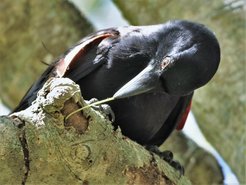Sharpening the science of tool use

The American Academy of Sciences (AAAS) has announced that Dr Barbara Klump, a postdoctoral research fellow in the Cognitive and Cultural Ecology Group, is a winner of the Science & SciLifeLab Prize for Young Scientists. Klump won the prize for submitting the best essay in the category of Ecology and Environment based on her PhD research. Her winning essay titled “Of crows and tools” is published online today in Science magazine.
The international prize from SciLifeLab, AAAS and Science magazine, is awarded annually to four young scientists for outstanding life science research from their PhD. Winners are selected based on an essay submitted to the editorial board of Science in one of four categories: Cell and Molecular Biology; Genomics, Proteomics and Systems Biology; Ecology and Environment; and Molecular Medicine. Of the four winning essays, a Grand Prize winner is selected to receive 30,000 USD in prize money while the three other category winners are awarded 10,000 USD each. Winners will have their essays published in Science and are invited for a week in Stockholm to attend the prize ceremony.
“We are so pleased that Barbara’s research is being acknowledged by this prize,” says Professor Martin Wikelski, managing director of the Max Planck Institute of Animal Behavior. “Tool use is a fascinating but rare behaviour in birds. Through rigorous science done during her PhD, she has shed light on the important element of environmental influence on this behaviour, and through clear and compelling communication she has captured interest in the public imagination.”
“Barbara´s work also provides first deep insights into the importance of collective behavior onto the evolution of social systems and animal culture - topics she can now explore in depth at the Max Planck Institute of Animal Behavior in Konstanz.”
Klump’s PhD research, conducted while at the University of St Andrews, examined the extremely rare behaviour of tool use in birds. Beginning with the New Caledonian crow (Corvus moneduoides)—the only nonhuman species known to craft hooks in the wild—Klump showed that the birds are picky about what material they use for making tools and will take pains to keep their tools safe if there is high risk of losing them. An idea from her PhD supervisor, Professor Christian Rutz, to study other crows that shared the unusually straight bill of New Caledonian crows (which Rutz thought might explain why they, but not other crow species, use tools) led to the Hawaiian crow (Corvus hawaiiensis) or ’Alalā and the discovery of only the second known example of species-wide tool use in crows.
"I am very excited and feel very honoured to have been awarded this prize, and I am extremely grateful to my PhD supervisor, Christian Rutz, and everyone in my PhD group who contributed to this work and supported me along the way,” says Klump of winning her category of Ecology and Environment for the Science & SciLifeLab Prize.
“People are fascinated by animals using tools, likely because we ourselves as a species are so reliant on tool use. I feel that this fascination together with the rigorous scientific experiments we conducted is a powerful combination to interest and excite people in my work.”
Originally from Germany, Klump received her master’s degree from Heidelberg University and a PhD from the University of St Andrews. After completing a postdoctoral fellowship at the University of St Andrews, she moved to the Max Planck Institute of Animal Behavior in Konstanz, where she is currently a postdoc in the Cognitive and Cultural Ecology Lab. Her research explores how a species’ ecology shapes its behavioral repertoire and Klump will continue this on a new system investigating cultural traditions in Australian Sulphur-crested cockatoos.
Read the interview with Barbara Klump: what motivated her to communicate, how she approached the essay, and why four years of procrastination finally gave way to putting pen to paper.
Facts:
The Science & SciLifeLab Prize for Young Scientists is a global prize aimed at rewarding scientists at an early stage of their careers.
The prize is awarded by AAAS and Science magazine in collaboration with SciLifeLab.
SciLifeLab, Science for Life Laboratory, is an institution for the advancement of molecular biosciences in Sweden.
